Have you ever wondered why Gyapa cookstoves are so efficient?
Gyapa ceramic liners are the key to Gyapa's fuel-efficinecy. When families cook on Gyapa, they place the charcoal in the ceramic liner, light it, and cook on the heat. Thanks to the ceramic liner, the heat is retained in close proximity to the cooking vessel, instead of being lost in the metal like other traditional stoves. This is how Gyapa cookstoves save families up to 50% charcoal.
Kwame, one of our Gyapa cookstove ceramic liner partners, makes 2,000 ceramic liners a month. He introduces us to his team of 8 and shows us his production line in Ghana in the video below.
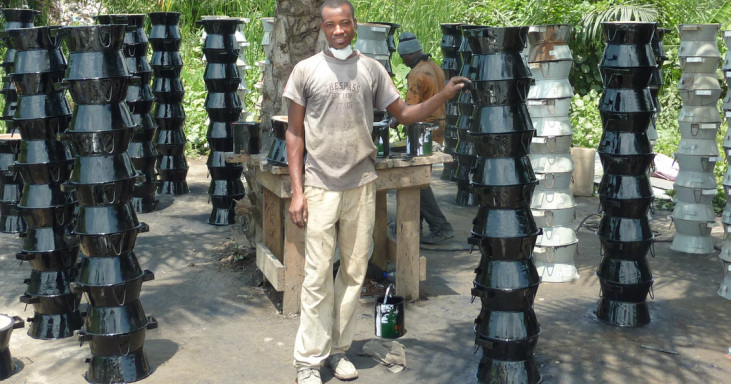 Peter showing his freshly painted Gyapa fuel-efficient cookstoves Peter Amako Atta began producing Gyapa cookstoves nine years ago and has grown into one of the largest stove manufacturers in Ghana. Based in the Achimota neighborhood of Accra, Peter used to sell shoes on the side of the road. Selling shoes offered no steady employment as Peter relied upon unpredictable consignment availability and product. Often, when shipments were delayed, Peter had no work. Peter was a part of the informal business sector in Ghana and without a set sales outlet.
In 2003, Peter received training from EnterpriseWorks to become a metal artisan manufacturing partner. Peter was attracted to the opportunity to become a manufacturer because of the importance he thought Gyapa cookstoves could be to Ghanaians. "Gyapa is very economical and saves a lot of charcoal for families," Peter said. He sensed that the Gyapa cookstove would be a very popular product in Ghana and wanted to be involved with the product as a sustainable and long lasting way to earn a living.
Peter began his business manufacturing the stoves himself, producing fewer than 100 stoves per month. Focused on growing his business each year, Peter has transitioned from a single manufacturer to managing his own business. Peter’s manufacturing site, peacefully hidden in the middle of a small banana plantation behind a city landfill, has grown to be one of the largest Gyapa producers in Accra. He now manages ten employees and produces over 1,200 stoves per month. Peter has grown his business each year and reinvested his profits to expand his operations. Stoves produced out of this site continue to be of the best quality and are sought after by retailers and consumers. Peter and his team manufactured nearly 10% of all Gyapa cookstoves in Ghana in 2012. “It is a very good product that people will buy and we can sell this nationwide. It saves charcoal and saves people money. I am planning to expand my business to access even more customers." Through his business success, Peter has also been able to purchase a plot of land where he plans to build his future home.
Peter has benefited from working capital loans from Gyapa Enterprises which he has used to expand his production capacity. We have provided almost $60,000 in loans and grants to cookstove production partners in our value chain just like Peter. Through the sale of carbon credits, we're able to provide strategic sustainable investments throughout the value chain, working to support individual business and to expand market linkages and networks to increase access of Gyapa stoves to new communities and households.
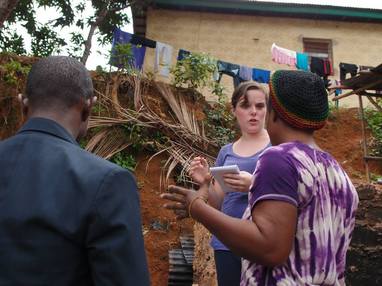 Issy interviews people in Sierra Leone Issy interviews people in Sierra Leone I have just got back from Sierra Leone where I was staying in the capital, Freetown. I was in Freetown for 3 weeks where I undertook a market assessment of Freetown’s improved cookstove market.
The Sierra Leone diet is similar to the Ghanaian diet; Fufu, Tilapia and Groundnut Soup are all common place. Another significant part of Sierra Leone diet are their green stews, made with either cassava leaf or potato leaf, but as I was talking to people about their eating habits, many of the guys would say they didn’t actually like it, which reminded me of my brothers adverse to anything green when we were growing up.
As I headed into town on the first day, I saw a mural which said ‘stop bush fires, stop charcoal burning, respect the law’ which was a little alarming, seeing as I’m here to research stoves that use charcoal. Upon closer inspection, it appeared to be an initiative of USAID and the US Forest Service International Programs. I later learned that there is a ban on charcoal production in Freetown.
Going to the market is always a lot of fun, as there is so much to see and potentially buy, so conducting the market research in the markets of Freetown was always going to be an exciting experience.
The central market in Freetown appeared to be never ending streets of stalls. At first, I was aimlessly walking around trying to find stalls that were selling cookstoves. Eventually I gave in and asked around. The stall holders I spoke to said to head to Ferry Junction, which was in a different part of town. I couldn’t really believe that there wasn’t anyone who sold cookstoves in the centre of town. So I carried on wandering around with the hope of finding something, and it also allowed me to enjoy and see parts of Freetown. I eventually came across a stall selling traditional coal pots. The guy running the stall was called ‘Elder Rider’ (he even had a helmet to prove it). ‘Elder Rider’ was an interesting character. As I approached, he said ‘This is an African store.' I explained what I was doing and after a while he agreed to chat with me. He provided some interesting responses to my questions, and he was a great first interview to get my project started.
I spoke to a variety of Sierra Leoneans, including commercial cooks and caterers. One amazing lady was called Fatimata, and she had a business selling breakfasts and lunches to a large office in Freetown. She would get up at 2am to start cooking, and would leave for the office at 6am to provide the office workers with both breakfast and lunch. She also had to cook for her household of 5 people. I’m not sure if she ever slept!
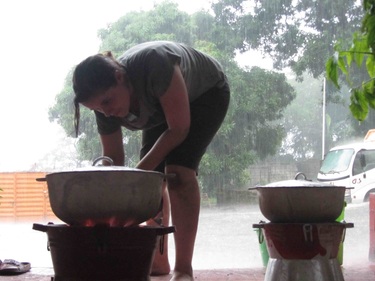 Conducting water boiling tests Conducting water boiling tests As a way of assessing how efficient the existing improved cookstoves that are available in Sierra Leone, I conducted a boiling water test on 3 different types of improved cookstoves and the traditional metal coal pots. I thought this was going to be fairly straight forward task, but it turned into somewhat difficult. I never thought the sight of boiling water would please me so much. Teaching myself how to competently use the cookstoves took some work, so when I finally had boiling water it felt like a huge success.
I have managed to meet with some great characters whilst in Sierra Leone, as well as see some amazing sights. I am now in my final few weeks working with Gyapa Enterprises before I go back to the UK.
We are introducing a new innovative label for our Gyapa fuel-efficient cookstoves. Every stove will have an individual warranty code, which not only allows customers to claim their warranty, but also certifies that they have purchased an Original Gyapa.
In this new commercial, airing late July on Ghana TV, Gyapa cookstove retailer, Rebecca, teaches a customer about the new certified Original Gyapa labels. Video
Watch our new commercial detailing the benefits of our new Gyapa cookstove labeling system (above)
On set
Our own staff member, Agnes Ofosu, stars in the new commercial, accompanied by Rebecca, a retailer who has been selling Gyapa cookstoves for 9 years
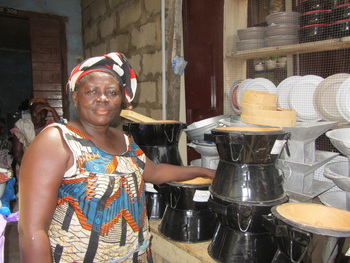 Photo of Gyapa retailer, courtesy of Issy Photo of Gyapa retailer, courtesy of Issy Hey, it’s ‘Issy the Intern.’ I've been kept very busy, and I'm excited to share what I've been up to. My big assignment has been 'mapping' retailers and producers in Ghana by taking photos and tagging them using the GPS function of my camera. I spent the first couple of days in the office getting to grips with the GPS function on my camera and how I could use it in order to create the network map of Gyapa cookstoves. We went to Makola and Madina Market where we met various retailers of Gyapa cookstoves. This was my first experience of a Ghanaian market, having spent the last 4 and bit years living in Brighton, England with their famous South Lanes, I was fairly accustomed to narrow, weaving alleys and walkways, but Makola & Madina Market are on another level. With stock towering over you I’m not sure if someone with claustrophobia would be able to cope. For me, however, it was a great experience. In Makola Market we met two wonderful retailers, Susie and Evelyn, and both gave fantastic interviews. While Carole Lundgren was interviewing them for a supply chain video project, I took photos, which allowed us to post updates on Facebook and Twitter about what we are doing before all the editing is complete. After finishing the interviews with both Susie and Evelyn we went across the city to Madina Market where we interviewed two further retailers and a commercial user. It was great to hear people say such positive things about Gyapa cookstoves, and we will definitely be able to make some cool videos out of the footage we got. We finished the day by going to visit two end users of Gyapa and got interviews with them. It was great to hear opinions of Gyapa from end users, which are not affiliated with the scheme. One of them gave such an amazing testimonial, we couldn’t quite believe it: "Gyapa is the best for every household." On Friday we took the 2 hour journey to Winneba, which is to the west of Accra, to visit Ekem. Ekem produces the clay liners, and this is what makes Gyapa so fuel efficient, as it retains the heat so users do not have to use as much charcoal. It was really interesting to hear what Ekem had to say, as he has worked with Gyapa Enterprises for 10 years and so has been there right from the beginning. He described in great detail the processes behind making the clay liners, which is a critical part of the Gyapa cookstove. I also used this opportunity to gather GPS points. The aim is to plot where all the producers and retailers are, and the aim to plot all the retailers and producers so we can see the distribution of the stoves. It is a great way for everyone to see the impact the programme has had, and is embedded into our website, so that everyone can see that faces of Gyapa! It’s been a great time here in Ghana. I've had some great experiences meeting the various people that are a part of the Gyapa network. I am looking forward to more visits to retailers and producers, because it is these amazing people that make the Gyapa cookstove network so great. See Issy's GPS Google map project on our Impact page: http://www.gyapa.com/impact.html
Indoor air pollution caused by traditional methods of cooking in developing countries can have severe health consequences on households, primarily women and children.
The Global Alliance for Clean Cookstoves explains the problem: A global market for clean cooking solutions is necessary because 3 billion people still cook with solid fuels each day. When burned in open fires and basic cookstoves, wood, coal, charcoal, and other solid fuels emit a harmful smoke that claims 4 million lives annually through a range of diseases and injuries – making household air pollution from cookstove smoke the fourth greatest health risk in the world
(Read the full article here)
PRESS RELEASE
Second Consecutive Carbon Credit Issuance Sets Record for Largest for Cookstoves by The Gold Standard Registry – Issued to Relief International/EnterpriseWorks (RI/EW)
Accra, Ghana (May 23, 2013) – For the second consecutive issuance the largest single number of carbon credits for any cookstove project certified by The Gold Standard – the benchmark standard for quality and rigor in the compliance and voluntary carbon markets – has been issued to Relief International’s EnterpriseWorks (RI/EW) division. Over 400,000
| Verified Emission Reductions (VERs) were generated and sold through The Gold Standard Registry; with each VER equivalent to one metric ton of carbon emissions. This transaction firmly places RI/EW as the leader in applying innovative finance to the power of entrepreneurship as a business model to combat poverty. Since 2007, nearly half a million Gyapa™ stoves have been sold, impacting over 2.4 million Ghanaians and saving users over $40.6 million in fuel costs which equates to over 800,000 acres of forests. The success of the project comes as a result of years of innovative work by RI/EW in the clean stoves sector in close partnership with ClimateCare, the U.S. Government’s USAID and EPA, and the Shell Foundation.
This record-breaking issuance of carbon credits is in acknowledgment of emission reductions through the use of Gyapa™ cookstoves in Ghana. Since 2002, EnterpriseWorks (EW) has played a critical role in Ghana realizing sustained growth in sales of fuel efficient cookstoves, capturing carbon credit while reducing disease and poverty. The production, sale and use of these low-cost innovative stoves which were developed by RI’s EnterpriseWorks, drive economic growth along with environmental impact.
| Gyapa Cookstove Carbon Credit Impact | Importantly, they also have a direct health impact by reducing household air pollution. The stoves last longer, reduce fuel costs, and are safer than traditional cookstoves. Registered as a carbon finance program in late 2007, the Gyapa™ fuel efficient cookstove has played a critical role in Ghana, realizing sustained growth in sales through the continued development and success of its local production, distribution and sales network throughout Ghana. RI/EW’s Gyapa™ industry has grown to include over 400 independent producers and 500 retail agents throughout Ghana. RI/EW takes a unique and innovative approach to promoting the Gyapa™ cookstove by partnering with and investing in entrepreneurs to support the continued growth of local industry. The production, sale and use of these low-cost innovative stoves drive economic growth along with environmental impact. The Gyapa™ stove technology reduces charcoal usage by up to 50%, reduces harmful smoke inhalation for the cooks and household, and is more durable and safer than traditional stoves. Gyapa™ stoves are sold in four different sizes to accommodate domestic and commercial cooking needs, providing significant socioeconomic, environmental, and health benefits to stove users and their communities. “Relief International has again demonstrated its leadership in the sector with progressive actions to combat poverty,” says Chip Levengood, Chairman of RI/EW’s Board, “Demonstrating the transformative impact of pairing innovative business strategies with development, this project has solidified itself as the leading improved cookstove program through its second consecutive record breaking issuance.” “Gold Standard cookstoves account for around 75% of carbon market cookstove projects worldwide,” says Adrian Rimmer, CEO of The Gold Standard Foundation, “We congratulate RI/EW’s Gyapa™ project for being part of this and delivering emission reductions and sustainable development impact at such scale.” “Since it was founded, ClimateCare has advocated integrated Climate and Development projects, designed from the outset to protect the environment and improve people’s lives” explains ClimateCare Director, Tom Morton “The Gyapa™ Stoves project is an excellent example of this approach. Having helped structure finance for this project, we’re delighted to see it cutting a record amount of carbon and having such a positive impact on the lives of local people.” ### Media Contact Carole Lundgren, Social Enterprise Development Officer carole.lundgren@ri.org About EnterpriseWorks and Relief International EnterpriseWorks (EW), a division of Relief International (RI/EW), utilizes sustainable, enterprise-oriented solutions to combat poverty’s systemic impacts. For 35 years, EW has built local private-sector driven efficiencies in energy, water, agriculture, and natural products/natural resource management value chains. Relief International is a Los Angeles-based global humanitarian organization that transforms adversity into renewal for the world’s most vulnerable populations. RI/EW’s team of 2,000 relief and development professionals work to bridge the gap between immediate emergency relief and long-term community development through innovative and holistic programming that is grassroots-based. In 2009, EW merged with Relief International bringing together two leaders in their respective fields. For more information, please visit www.ri.org and www.enterpriseworks.org and www.gyapa.com. About The Gold Standard For ten years, The Gold Standard has pioneered the way climate change is addressed. Its ‘results based finance’ approach - in which individuals, corporations and governments buy credits against verified emission reductions and sustainable development outcomes - has channelled more than half a billion Euros into 900+ low carbon development projects that would otherwise not have gone ahead. The Gold Standard was established in 2003 by WWF and has more than 80 NGO partners worldwide. For more information, please visit: www.cdmgoldstandard.org About ClimateCare ClimateCare mobilises the power and scale of private finance to deliver projects with positive environmental and social impacts around the world. We combine the vision of a social enterprise and the commercial experience of an investment bank. Leveraging mainstream funding, we profitably deliver some of the largest, most successful corporate sustainability initiatives in the world. From offices in Africa, Europe and Asia Pacific we help many of the world’s leading brands, organisations and governments scale up the impact of their initiatives. By investing their resources in projects that directly combat climate change and poverty, improve health and increase community welfare, we build better futures for millions of people around the world. For more information, please visit www.climatecare.org.
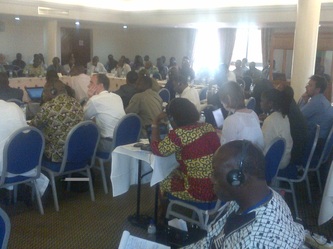 Amavi Bada, Regional Enterprise Development Manager, recently attended the West Africa Clean Cooking Alliance (WACCA) conference in Ouagadougou, Burkina Faso. WACCA is an initiative of The ECOWAS Centre for Renewable Energy and Energy Efficiency (ECREEE). This West African regional organization's main objective is to provide access to efficient, sustainable and affordable cooking energy in the ECOWAS (Economic Community of West African States) region. During the 3-day conference, he's been able to share best practices and challenges on clean cooking and how these challenges are overcome from within the region and beyond. In addition, he's engaged and debated on how to achieve an integration of clean cooking into national energy strategies. As a group, participants are taking the dialogue forward on developing policies and planning tools that promote clean, safe, and efficient cooking as a driver of economic growth and improves environmental and social conditions. The group will end the conference by creating and validating the WACCA Regional Action Plan to set the agenda as a region for the upcoming years.
| There was also a 3-day exhibition that showcased regional and international exceptional products, technologies and services in the area of efficient and clean cooking from West Africa and other regions.
Amavi has had the opportunity to engage and connect with other organizations with a passion for clean cookstoves, and look forward to creating partnerships within the region.
| |
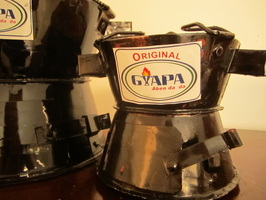 A smaller version of our family-sized cookstove was recently created by local manufacturers for product testing. The smaller sized stove, referred to as "Baby Gyapa" by our Marketing Officers, will be primarily used to boil water in tea pots. "Baby Gyapa" market research will happen in the upcoming weeks, and we'll see how many of these new little stoves we'll want to introduce into the world. If successful, this new little Gyapa cookstove will join our other four larger sizes, giving our customers a versatile range of cookstoves based on their needs.
Welcome to the product line, "Baby Gyapa!"
|



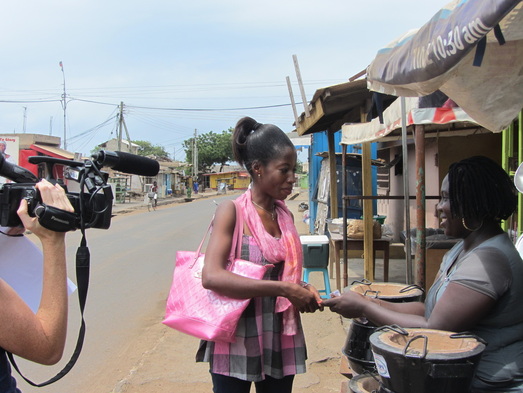



 RSS Feed
RSS Feed
